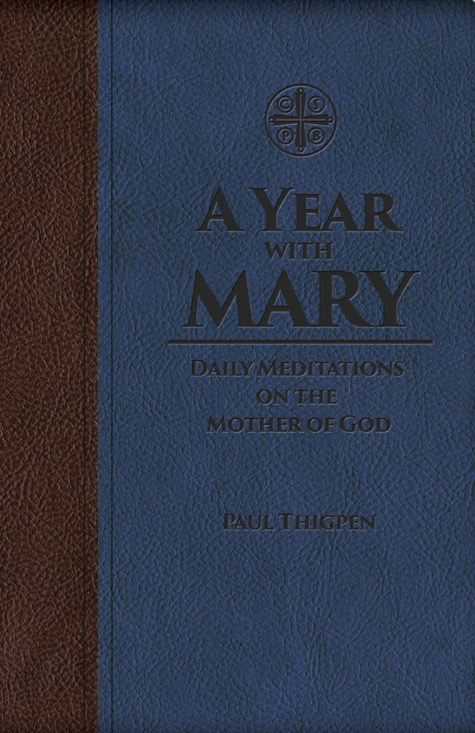A Year with Mary draws from an ocean of Marian insights and theology, deepening readers’ devotion through 365 reflections on Our Blessed Mother. These three meditations center on Mary’s Magnificat.
Mary’s Hymn Of Praise to God
The longest quote from Jesus’ mother was recorded in St. Luke’s Gospel: a hymn of praise to God, inspired by her encounter with her kinswoman St. Elizabeth.
My soul magnifies the Lord,
and my spirit rejoices in God my Savior,
for he has regarded the low estate of his handmaiden.
For behold, henceforth all generations will call me blessed;
for he who is mighty has done great things for me,
and holy is his name.
And his mercy is on those who fear him
from generation to generation.
He has shown strength with his arm,
he has scattered the proud in the imagination of their hearts,
he has put down the mighty from their thrones,
and exalted those of low degree;
he has filled the hungry with good things,
and the rich he has sent empty away.
He has helped his servant Israel,
in remembrance of his mercy,
as he spoke to our fathers,
to Abraham and to his posterity for ever.
—The Blessed Virgin Mary, Luke 1:46–55
Consideration
When I consider myself honestly, which category in Our Lady’s hymn am I more likely to fit: those who are proud, mighty, rich? Or those who fear God, those who are lowly, those who are hungry?
Prayer
Blessed Mother of my Lord, help me to humble myself before God so that he can lift me up again in mercy. Teach me by your example to hunger for righteousness, so that I can be filled.
“All generations will call me blessed!”
St. Alphonsus invites us to be among those whom Mary prophesied would call her blessed down through the generations.
How many who were once proud have become humble by devotion to Mary! How many who were ruled by passion have become restrained! How many in the midst of darkness have found light! How many who were in despair have found confidence! How many who were lost have found salvation by the same powerful means!
All this, Mary clearly foretold in the house of Elizabeth, in her own sublime canticle: “Behold, henceforth all generations will call me blessed!” (Lk 1:48). And St. Bernard, interpreting her words, says, “All generations call you blessed, because you have given life and glory to all nations; for in you sinners find pardon, and the righteous find perseverance in the grace of God.”
For this reason, the devout monk Lanspergius has our Lord address the world in this way: “Men, poor children of Adam, who live surrounded by so many enemies and in the midst of so many trials! Endeavor to honor my Mother and yours in a special way. For I’ve given Mary to the world, so that she may be your model, and so that from her you may learn to lead good lives. I’ve given her also to be a refuge to which you can flee in all your afflictions and trials. I’ve made this daughter of mine in such a way that no one need fear or have the least reluctance to turn to her. For this purpose I’ve created her of such a kind and compassionate disposition that she doesn’t know how to despise anyone who takes refuge with her, nor can she deny her favor to anyone who seeks it. The mantle of her mercy is open to all, and she allows no one to leave her feet without consoling him.”
May the immense goodness of our God be ever praised and blessed for having given us such a great, such a tender, such a loving mother and advocate!
—St. Alphonsus Liguori, The Glories of Mary
Consideration
Am I among those who call Mary blessed? Is it my frequent habit to take time to praise her for her role in my salvation, and to ask for her assistance in living a holy life?
Prayer
With St. Elizabeth, I greet you, my Lady: “Blessed are you among women, and blessed is the fruit of your womb!” (Lk 1:42).
Truly, Blessed Are You Among Women
St. Sophronius offers an abundance of reasons why St. Elizabeth could rightly say to Mary, “Blessed are you among women.”
Truly, Mary, blessed are you among women, for you have turned Eve’s curse into a blessing; and Adam, who before now stood under a curse, has been blessed because of you.
Truly, blessed are you among women, because through you, the blessing of the Father has shone down on men, setting them free of the ancient curse.
Truly, blessed are you among women, because through you your ancestors have found salvation; for you were to bear the Savior who would win salvation for them.
Truly, blessed are you among women, for without seed you have borne fruit, giving birth to the One who gives blessings to the whole world and redeems it from the curse that had brought forth thorns.
Truly, blessed are you among women, because, though you are a woman by nature, you have become, in truth, the Mother of God.
If the One you bear is truly God made flesh, then rightly do we call you the Mother of God, for you have indeed given birth to God.
—St. Sophronius
Consideration
If I were to create my own list of reasons why I can rightly call Mary “blessed among women,” what would they be?
Prayer
Mary, truly you are blessed, for you are poor in spirit and meek, merciful and pure in heart, and you have mourned. You are a peacemaker who has hungered and thirsted for righteousness in every soul; you have been persecuted for righteousness’ sake, and slandered for the sake of your Son. Now you rejoice and are glad, for great is your reward in heaven! (See Mt 5:3–12.)
ooo
This article is taken from a chapter in A Year with Mary by Paul Thigpen which is available from TAN Books.









